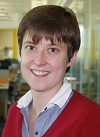CRUK case studies
Read about some of our past and present ECAT-linked CRUK fellows

Case study: Faye Robertson
ECAT-linked CRUK Clinical Research Fellow
I am an ECAT/CRUK clinical research fellow in the second year of my PhD at the Centre for Regenerative Medicine. My background is as an oncology registrar at the Edinburgh Cancer Centre and I applied for ECAT from ST4, not long after returning from maternity leave.
I had always wanted to do a PhD for reasons which will be common to many ECAT applicants: I saw basic science research as the foundation of many of our treatments, I had very much enjoyed my experiences in the lab and I hoped to have a career in research. I knew about ECAT because I had done an academic foundation job in Edinburgh and it seemed to be the perfect opportunity: a funded PhD with a massive choice of centres and labs; the chance to design my own project with the support of experienced researchers; Edinburgh!
I chose to join Steve Pollard’s lab in the CRM to study quiescence in glioblastoma stem cells. Steve and his group have been studying neural stem cells in adherent monolayer culture and have particular expertise in genome editing with CRISPR. My project began by using an in vitro model of quiescence to interrogate a library of known stem cell modulators with respect to their effect on neural stem cells engineered to overexpress a transcription factor, FOXG1, which is highly expressed in glioblastoma (GBM). Since the initial optimisation and implementation of a high content screen, I have been investigating the synergy between FOXG1 and – among others - Wnt pathway activation, to understand better how FOXG1 works in GBM to drive stem cell proliferation. I am learning to use genome editing techniques to create cell lines in which I can study the relevant pathways: something which is far-removed from my clinical job and hugely exciting.
Being on ECAT has meant that I have a network of peers with whom to share my experiences. The annual ECAT days and quarterly ECATRIP meetings allow everyone to get together and present their research, which is such a useful process in a very non-threatening group! It can be difficult, being a medic, even with some lab experience, to go into a group like mine which is large and has a very intimidating skill-set. Although everyone is extremely helpful and friendly, it was clear to me, at the start, that I just didn’t know as much molecular biology as I might if I had just finished my master’s in the subject. So, the support of people in ECAT (the directors and the other fellows) is one of the major strengths of the programme. Fortunately, the learning curve has been quick and enjoyable.
I had no difficulty in gaining approval to work 80%, with one day per week to look after my small children. I discussed this intention from the outset when visiting labs and designing a project which would allow for that pattern of working. Steve was very accommodating of my plans and Jo Ness, along with the HR team at the University, had the administrative side of it sorted instantly and, so far, it is working out very well.
So, I would recommend ECAT for the chance to study (almost) whatever you like in a place with incredibly diverse groups and opportunities, supported by a team who know exactly what clinical academics in training need. Good luck.

